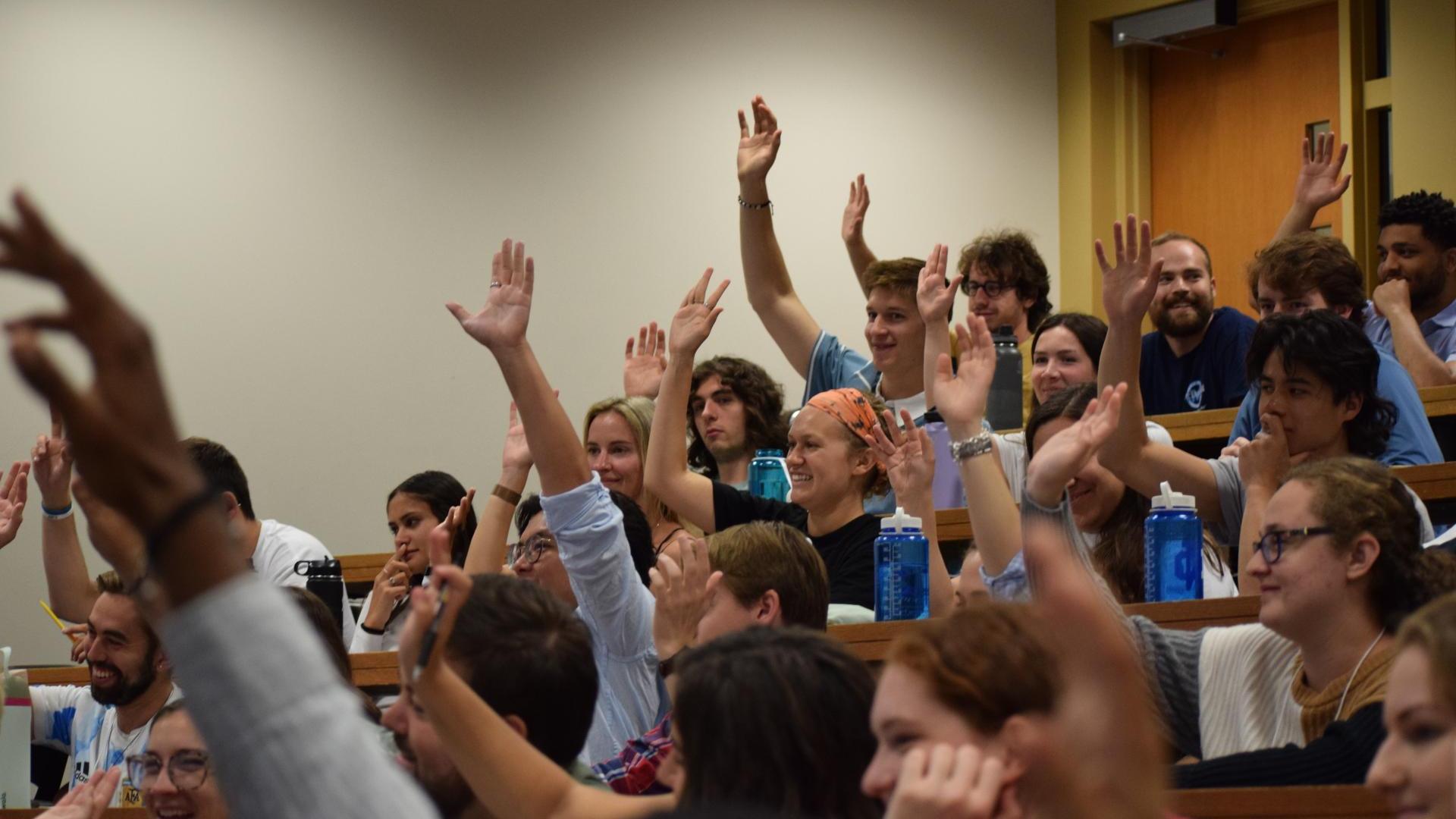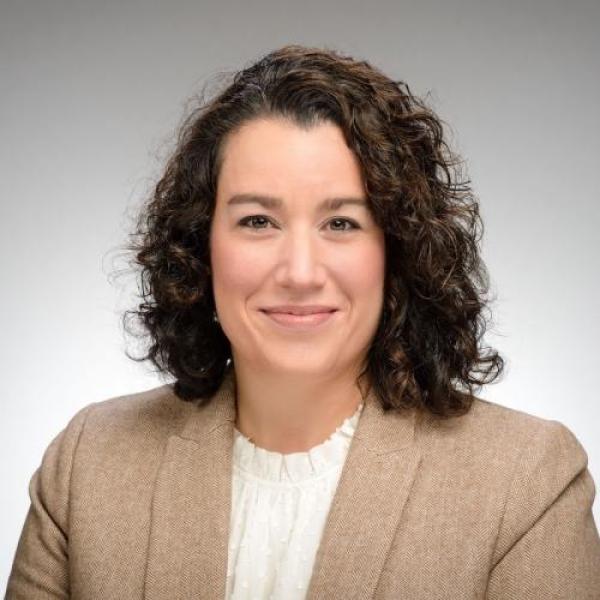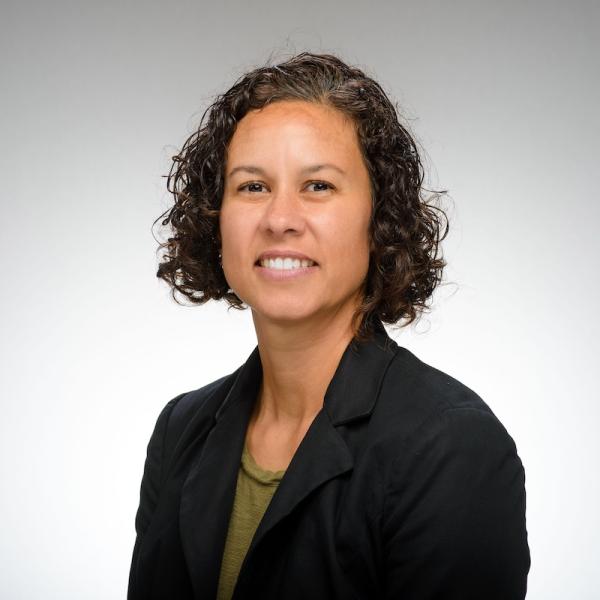M.Ed. Curriculum

M.Ed. Overview
ACE teachers are assigned to one of three grade-level curricular tracks (elementary, middle, or high school) while concurrently pursuing a Master’s degree in education from the University of Notre Dame. Participants in the middle and secondary tracks further specialize in one of four disciplinary areas: English/Language Arts, Mathematics, Science, or Social Studies. The specific methods and content courses required are determined by the developmental level and subject area of the assigned track.
If you are interested in learning more about the coursework our ACE teachers engage in, check out our course offerings and descriptions below:
Academic Scope & Sequence
Summer Session I
EDU 60020 | Introduction to Teaching - Elementary (1)
This course provides an introduction to the meaning and practice of contemporary teaching. It includes historical highlights in public and Catholic education, and considers cultural and social contexts of today's Catholic schools. Professional, legal, and ethical responsibilities of the teacher are emphasized along with classroom organization and management.
EDU 60060 | Teaching in Catholic Schools or EDU 60070 | Teaching Religion in Catholic Schools (1)
- EDU 60060 | An overview of six core topics of Catholic teaching along with a discussion of their influence and impact on Catholic school culture and teaching.
- EDU 60070 | An overview of six core topics of Catholic teaching along with initial planning with grade level master teachers to teach these topics in Catholic schools.
EDU 60102 | Effective Elementary Classroom Teaching (2)
An introduction to the culture and dynamics of the elementary school classroom with emphasis placed on planning, instruction, and assessment practices to meet relevant standards and goals. The course includes an integrative survey of research-based methods that lead to effective daily instruction to meet the needs of all elementary-aged learners.
EDU 60132 | Mathematics in Elementary Education (2)
The development of the mathematical and pedagogical content knowledge for teaching mathematics in the elementary classroom (K-6). The course gives attention to learning theory, evidenced-based instructional methods, frameworks, and assessment practices, and standards of the National Council of Teachers of Mathematics.
EDU 60182 | Teaching of Reading (3)
An exploration of the research and instructional strategies of reading instruction including emergent literacy, reading readiness, phonemic awareness, phonics, word recognition, vocabulary development, fluency, cultural literacy, and reading comprehension, as well as direct, explicit, and multi-sensory strategies for reading remediation.
EDU 60192 | Science & Social Studies Teaching in the Elementary Grades (1)
An introduction to methods for teaching elementary science and social studies with a focus on selecting standards-based content, developing inquiry-based lessons, and finding and using appropriate resources.
EDU 63500 | Integrative Seminar (1)
An integration of the professional, communal, and spiritual dimensions of the ACE program. Participants engage in active listening as well as interactive and collaborative learning exercises to integrate these pillars of ACE in their professional service to Catholic schools.
EDU 65032 | Practicum (2)
An intense practicum in the local area schools during the summer. The clinical experience will include closely supervised teaching as well as reflections on that experience. Extensive planning of instruction is required.
EDU 60022 or EDU 60024 | Introduction to Teaching - Middle/High School (1)
This course provides an introduction to the meaning and practice of contemporary teaching. It includes historical highlights in public and Catholic education, and considers cultural and social contexts of today's Catholic schools. Professional, legal, and ethical responsibilities of the teacher are emphasized along with classroom organization and management.
EDU 60060 | Teaching in Catholic Schools or EDU 60070 | Teaching Religion in Catholic Schools (1)
- EDU 60060 | An overview of six core topics of Catholic teaching along with a discussion of their influence and impact on Catholic school culture and teaching.
- EDU 60070 | An overview of six core topics of Catholic teaching along with initial planning with grade level master teachers to teach these topics in Catholic schools.
EDU 606XX | Content Methods I (2)
In this course, participants will extend their developing knowledge of curriculum and instructional planning to reflect the unique content and skill of content area pedagogy. By exploring current research from peer reviewed literature, examining evidenced-based practices, discussing key features of state and national standards, and simulating relevant instructional scenarios, participants will begin to plan and deliver high-impact learning experiences for their middle and high school students.
EDU 60695 | Literacy in the Content Areas (1)
This course will focus on reading and writing in the content areas and introduce literacy strategies, resources, and assessments for use in middle and high school classrooms. Specific attention will be given to teaching and learning of texts with scientifically-based reading components of comprehension, vocabulary development, use of language to support learning, and informal and formal writing. Inclusion of interventions that are direct, explicit, and multi-sensory are provided.
EDU 60624 or EDU 60256 | Foundations of Middle/High School Teaching (3)
An introduction to the culture and dynamics of the middle/high school classroom with emphasis placed on planning, instruction, and assessment practices to meet relevant standards and goals. The course includes an integrative survey of research-based methods that lead to effective daily instruction to meet the needs of all young adolescent learners.
EDU 63500 | Integrative Seminar (1)
An integration of the professional, communal, and spiritual dimensions of the ACE program. Participants engage in active listening as well as interactive and collaborative learning exercises to integrate these pillars of ACE in their professional service to Catholic schools.
EDU 65032 | Practicum (2)
An intense practicum in the local area schools during the summer. The clinical experience will include closely supervised teaching as well as reflections on that experience. Extensive planning of instruction is required.
Academic Year I
EDU 60410 | Topics in Educational Psychology (2, Spring)
Readings and reflections on topics in Educational Psychology relevant to the experiences of first year teacher: The course is divided into three sections, each covering a different topic and supervised by one of the faculty members: (1) Student Culture (2) Teaching and learning (3) Motivation.
EDU 65930 | Clinical Seminar (1, Fall & Spring)
The course focuses on the development of the teacher as a professional. Reflective analysis relative to best practices and current research is documented. Evidence is accumulated in the form of written guided reflections, which are placed in a growing professional portfolio.
EDU 65950 | Supervised Teaching (2, Fall & Spring)
The course focuses on classroom teaching. It includes the observation of classroom teaching, examination of instructional and planning materials, meetings with the ACE teacher, mentor teacher and building principal, and the collection of field notes and evaluations for formative and summative assessment.
EDU 60410 | Topics in Educational Psychology (2, Spring)
Readings and reflections on topics in Educational Psychology relevant to the experiences of first year teacher: The course is divided into three sections, each covering a different topic and supervised by one of the faculty members: (1) Student Culture (2) Teaching and learning (3) Motivation.
EDU 65930 | Clinical Seminar (1, Fall & Spring)
The course focuses on the development of the teacher as a professional. Reflective analysis relative to best practices and current research is documented. Evidence is accumulated in the form of written guided reflections, which are placed in a growing professional portfolio.
EDU 65950 | Supervised Teaching (2, Fall & Spring)
The course focuses on classroom teaching. It includes the observation of classroom teaching, examination of instructional and planning materials, meetings with the ACE teacher, mentor teacher and building principal, and the collection of field notes and evaluations for formative and summative assessment.
Summer Session II
EDU 60112 | Mathematics in Elementary Education II (1)
In this course, participants will draw on their experiences as educators to improve their capacity to apply content-specific pedagogies in the elementary setting (K-6). By examining evidenced-based practices and discussing key features of state and NCTM standards, participants will be expected to refine and enhance how they design instruction and assessments that implement core mathematics teaching practices.
EDU 60142 | Reading & Langauge Arts in Elementary Education (3)
An integrated approach to literacy instruction designed to help children make sense of the world through literacy expression of all language arts elements including grammar, spelling, writing, and speaking and listening skills as well as continuing their understanding of essential reading components using quality children's literature and multi-sensory approaches. Course content will include a focus on assessment with readings on current research, practice in constructing traditional and performance assessments in relation to stated unit goals, and analyses of results to inform future planning and instruction.
EDU 60162 | Content Methods for Elementary Education (2)
A review of content-specific methods framed by readings on theory and evidence-based practices and frameworks will enable participants to develop cohesive units of study which integrate reading, writing, mathematics, social studies and science.
EDU 60312 | Inclusive Teaching Practices in Elementary (2.5)
A survey in inclusive education with emphasis on the elementary-aged student is followed by an in-depth study of the common learning issues in the elementary grades. Academics, behavior, and executive functioning are addressed with a focus on strategies and assessment.
EDU 60455 | Development & Moral Education in Childhood & Adolescence (3)
A systematic treatment of cognitive, social, biological, and personality development during childhood through late adolescence relating to education and an examination of the theoretical and research bases of moral development and their implications for P-12 classrooms.
EDU 60875 | Supporting English Language Learners (1)
Introduction to the process of language acquisition. Additional focus upon practical pedagogical strategies for supporting English Language Learners(ELLs) at all age levels.
EDU 63500 | Integrative Seminar (1)
An integration of the professional, communal, and spiritual dimensions of the ACE program. Participants engage in active listening as well as interactive and collaborative learning exercises to integrate these pillars of ACE in their professional service to Catholic schools.
Elective
EDU 60865 | Education Technology (1)
This course explores how educators can strategically leverage educational technology to foster student-centered, differentiated learning experiences that honor the inherent dignity of every student as created in the image and likeness of God. Moving beyond superficial or purely “engaging” tools, we will focus on blended learning models and technologies that meaningfully support universally designed, data-informed instruction across all grade levels and content areas. Through the lens of blended learning, students will engage with practical strategies for lesson planning, classroom management, and EdTech tool selection. We will also critically examine the emerging role of generative AI in teaching and learning, considering both its instructional potential and its ethical implications.
EDU 60162 | Content Methods II (3)
In this course, participants will draw on their experiences as educators to improve their capacity to apply content-specific pedagogies in a middle and high school setting. By analyzing peer-reviewed literature, examining evidenced-based practices, discussing key features of state and national standards, and simulating relevant instructional scenarios, participants will be expected to refine and enhance how they design learning experiences and assessments that implement key aspects of content pedagogy.
EDU 60324 or 60336 | Inclusive Teaching Practices in Middle/High School (2.5)
A survey in inclusive education with emphasis on the (early) adolescent student is followed by an in-depth study of the common learning issues in the elementary grades. Academics, behavior, and executive functioning are addressed with a focus on strategies and assessment.
EDU 60455 | Development & Moral Education in Childhood & Adolescence (3)
A systematic treatment of cognitive, social, biological, and personality development during childhood through late adolescence relating to education and an examination of the theoretical and research bases of moral development and their implications for P-12 classrooms.
EDU 60875 | Supporting English Language Learners (1)
Introduction to the process of language acquisition. Additional focus upon practical pedagogical strategies for supporting English Language Learners(ELLs) at all age levels.
EDU 63500 | Integrative Seminar (1)
An integration of the professional, communal, and spiritual dimensions of the ACE program. Participants engage in active listening as well as interactive and collaborative learning exercises to integrate these pillars of ACE in their professional service to Catholic schools.
Elective
EDU 60865 | Education Technology (1)
This course explores how educators can strategically leverage educational technology to foster student-centered, differentiated learning experiences that honor the inherent dignity of every student as created in the image and likeness of God. Moving beyond superficial or purely “engaging” tools, we will focus on blended learning models and technologies that meaningfully support universally designed, data-informed instruction across all grade levels and content areas. Through the lens of blended learning, students will engage with practical strategies for lesson planning, classroom management, and EdTech tool selection. We will also critically examine the emerging role of generative AI in teaching and learning, considering both its instructional potential and its ethical implications.
Academic Year II
EDU 60172 | Assessment in Elementary Education (1, Fall & Spring)
Readings on assessment principles and practices, and training in the construction, use, and analysis of formative and summative assessments in Elementary Education. Strategies and technologies for the design of different types of assessments to meet the needs of all learners, analysis of results in relation to learning outcomes, and data-driven decision-making will be emphasized.
EDU 65930 | Clinical Seminar (1, Fall & Spring)
The course focuses on the development of the teacher as a professional. Reflective analysis relative to best practices and current research is documented. Evidence is accumulated in the form of written guided reflections, which are placed in a growing professional portfolio.
EDU 65935 | Capstone Seminar in Teaching & Practice (1, Spring)
This culminating course of the ACE M.Ed. provides opportunity for integration of study and praxis through assignments to show the development of the teacher as a professional. Portfolio evidence is accumulated in the form of goal setting, a professional growth project, annotated video showing PI mastery, and a capstone reflection.
EDU 65950 | Supervised Teaching (2, Fall & Spring)
The course focuses on classroom teaching. It includes the observation of classroom teaching, examination of instructional and planning materials, meetings with the ACE teacher, mentor teacher and building principal, and the collection of field notes and evaluations for formative and summative assessment.
Elective
EDU 60885 | Supporting English Language Learners II (2, Fall)
This course is designed to complement and follow EDU 60875. The course focus is upon key themes associated with ELL instruction: research, linguistics, applied theories, and content-based strategies.
EDU 607XX | Content Area Assessment (1, Fall & Spring)
This course provides readings on assessment principles and practices, and training in the construction, use, and analysis of formative and summative assessments in instruction. Strategies and technologies for the design of different types of assessments to meet the needs of all learners, analysis of results in relation to learning outcomes, and data-driven decision-making will be emphasized.
EDU 65930 | Clinical Seminar (1, Fall & Spring)
The course focuses on the development of the teacher as a professional. Reflective analysis relative to best practices and current research is documented. Evidence is accumulated in the form of written guided reflections, which are placed in a growing professional portfolio.
EDU 65935 | Capstone Seminar in Teaching & Practice (1, Spring)
This culminating course of the ACE M.Ed. provides opportunity for integration of study and praxis through assignments to show the development of the teacher as a professional. Portfolio evidence is accumulated in the form of goal setting, a professional growth project, annotated video showing PI mastery, and a capstone reflection.
EDU 65950 | Supervised Teaching (2, Fall & Spring)
The course focuses on classroom teaching. It includes the observation of classroom teaching, examination of instructional and planning materials, meetings with the ACE teacher, mentor teacher and building principal, and the collection of field notes and evaluations for formative and summative assessment.
Elective
EDU 60885 | Supporting English Language Learners II (2, Fall)
This course is designed to complement and follow EDU 60875. The course focus is upon key themes associated with ELL instruction: research, linguistics, applied theories, and content-based strategies.
Meet the M.Ed. Faculty
M.Ed. Faculty
The ACE Faculty of Supervision and Instruction constitute the full-time M.Ed. faculty at Notre Dame. These university-based faculty teach courses during the summer and visit ACE teachers during the school year, conducting formal and informal observations and evaluations. For adjunct faculty, ACE draws upon talented and committed educators from nationally-renowned programs across the country, as well as from the deep pool of talented researchers with interests in education at Notre Dame, and expert practitioners in the South Bend community.
Connect with ACE
The ACE Teaching Fellows Recruitment and Admissions team will meet with prospective applicants all across the country, attending career & post-graduate service fairs, hosting information nights, and visiting college campuses. You'll have the chance to learn and ask questions about the M.Ed., the application process, community life, and more. Check-out the links below to connect with our team, request more information or schedule a time for us to chat. We look forward to meeting you!
 Alliance for Catholic Education
Alliance for Catholic Education




















